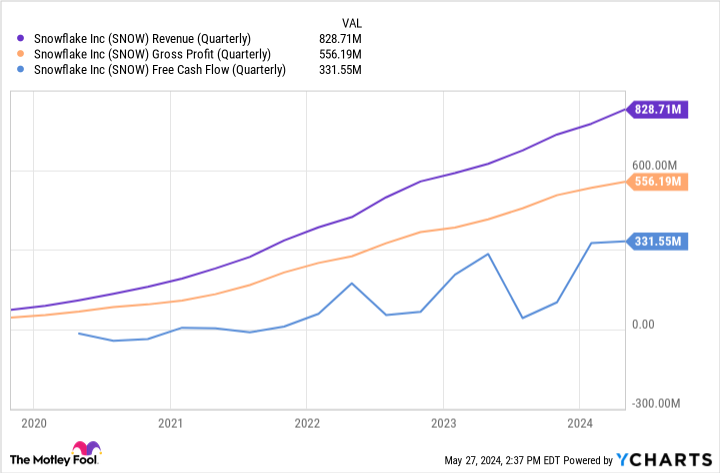Millionaire Investor Brad Gerstner Just Sold This Artificial Intelligence (AI) Stock

Altimeter Capital, led by Brad Gerstner, has long been a supporter of Snowflake, but it recently trimmed its position.
Have you ever been excited to go to a concert for one of your favorite artists, only to be uninspired by their performance in a live setting? How about watching a star athlete in college never reach their full potential in the pros?
That experience can be applied to investing as well.
Sometimes a start-up can garner an incredible amount of attention during its time as a private company. In many instances, these companies attract high-profile venture capital (VC) investors and notable brands as customers. Unsurprisingly, investors salivate at the opportunity to invest in these businesses upon an initial public offering (IPO).
In recent memory, I cannot think of a company that fetched more attention for its IPO than Snowflake (SNOW -3.38%), which had the biggest IPO for a software company in history.
And yet since going public in late 2020, the stock has returned negative 45%. Talk about not living up to expectations.
Is now an opportunity to buy the dip in Snowflake, or is a new blizzard unfolding right before our eyes?
Altimeter Capital trims its stake in Snowflake
One of Snowflake’s longest-standing investors is the hedge fund Altimeter Capital, which is led and managed by Brad Gerstner.
Altimeter invested in Snowflake while the company was still private, and built up a sizable position in the years leading to the IPO. While this would suggest that Gerstner is a staunch supporter of Snowflake, his latest 13F filing headlined a 17% reduction in his stake of the company.
During the first quarter, Altimeter sold 2.1 million shares of Snowflake. Moreover, filings suggest that Altimeter reallocated some of this capital into opportunities in semiconductors, IT infrastructure, and e-commerce.
It’s important to note that even though Altimeter reduced its stake in Snowflake by a considerable amount, the software company still remains the largest position in the fund. I wouldn’t be dissuaded by that point, however.
Keep in mind that Gerstner invested in Snowflake almost 10 years ago. Even though the stock is down since going public, Altimeter almost certainly still has an enormous gain in its position.
Image source: Getty Images.
Is Snowflake an AI opportunity?
Over the last 18 months, artificial intelligence (AI) has erupted as the technology sector’s next big wave. Big tech firms such as Microsoft, Alphabet, Amazon, and Nvidia have captured the attention of AI enthusiasts across Wall Street.
However, AI is not just reserved for megacap tech companies. Emerging players such as Palantir Technologies, ServiceNow, Datadog, and MongoDB are some of the leading AI software-as-a-service (SaaS) developers. It’s curious not to see Snowflake among the list of budding AI opportunities.
The reality is that 2024 hasn’t been kind to Snowflake. Earlier this year, the company shocked investors when CEO Frank Slootman abruptly resigned. Following his departure, a rising number of investors began to wonder where Snowflake was headed.
More recently, the company attempted to make splash by releasing a large language model (LLM) called Arctic. I saw this move as no more than a head fake.
The AI realm is already filled with LLMs such as ChatGPT, Gemini, Llama, and Claude. Each of these generative AI models is built by a large-cap tech enterprise with deeper pockets and a broader reach than Snowflake.
Snowflake has yet to prove that it can compete in the AI landscape at a high level. Furthermore, my suspicion is that Gerstner has identified more compelling opportunities and chose to take some gains off the table in Snowflake to pursue those instead.
Is now a good time to invest in Snowflake?
I’ll admit that the financial results illustrated in the chart below don’t exactly spell disaster. Snowflake’s revenue is witnessing respectable growth, and the company’s margin profile is also operating at a healthy level.
While free cash flow remains fairly inconsistent, this is likely more attributable to a challenging macroeconomic picture featuring unusually high inflation and rising borrowing costs — both of which strongly impact corporate budgets.
SNOW Revenue (Quarterly) data by YCharts
When it comes to investing in Snowflake, you should be focusing on the long-term picture over past performance. This is where issues arise. Turnover at the executive level and a seemingly delayed start in the AI marathon paint an enigmatic picture at best.
Moreover, even with a cratering stock price, Snowflake still trades at a price-to-sales (P/S) ratio of 15. By contrast, the P/S of the S&P 500 is only 2.5.
It’ll be interesting to see if Gerstner continues trimming his position in Snowflake in the coming quarters. Right now, I’d sit on the sidelines when it comes to Snowflake. The valuation appears disconnected from market fundamentals, and an unclear AI strategy provides an unwanted degree of discomfort for growth investors.
Suzanne Frey, an executive at Alphabet, is a member of The Motley Fool’s board of directors. John Mackey, former CEO of Whole Foods Market, an Amazon subsidiary, is a member of The Motley Fool’s board of directors. Adam Spatacco has positions in Alphabet, Amazon, Microsoft, Nvidia, and Palantir Technologies. The Motley Fool has positions in and recommends Alphabet, Amazon, Datadog, Microsoft, MongoDB, Nvidia, Palantir Technologies, ServiceNow, and Snowflake. The Motley Fool recommends the following options: long January 2026 $395 calls on Microsoft and short January 2026 $405 calls on Microsoft. The Motley Fool has a disclosure policy.




